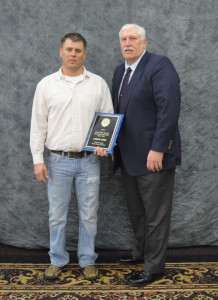
The South Dakota Association of Rural Water Systems (SDARWS) recently named Tripp County WUD System Operations Specialist Jason Orel as the top Rural Water System Operations Specialist during the organization’s Annual Technical Conference in Pierre.
“Jason is a great asset to our water system and he goes above and beyond using a common sense approach in his day to day duties,” said Tripp County WUD Manager Russ Phillips. “Jason has come to know our large geographical system, which encompasses 2500 miles of pipe stretching into five counties and 2519 customers. We at Tripp County Water User District feel very lucky to have an operator such as Jason on our work force and are proud to see him receive Operator of the Year.”
Orel holds certifications in Class II Water Distribution, Class I Water Treatment,
Class I Wastewater Collection, and Class I Stabilization Pond.
Orel was born and raised in Winner. He was very active in many sports throughout his school years, but excelled in wrestling. He was a three time state wrestling runner-up and graduated from Winner High School in May 2003.
Tripp County Water Users District is located in Winner and serves the counties of Tripp, Gregory, portions of Lyman, Mellette and Todd, individually serves the towns of Witten, Wood, Herrick, Fairfax, and St. Charles, and bulk serves the towns of Colome, Dallas, Burke, Bonesteel, six Native American communities.
The South Dakota Rural Water Annual Technical Conference in Pierre annually hosts over 450 individuals and provides water and wastewater educational presentations for board members, managers, and operations specialists from throughout South Dakota.
